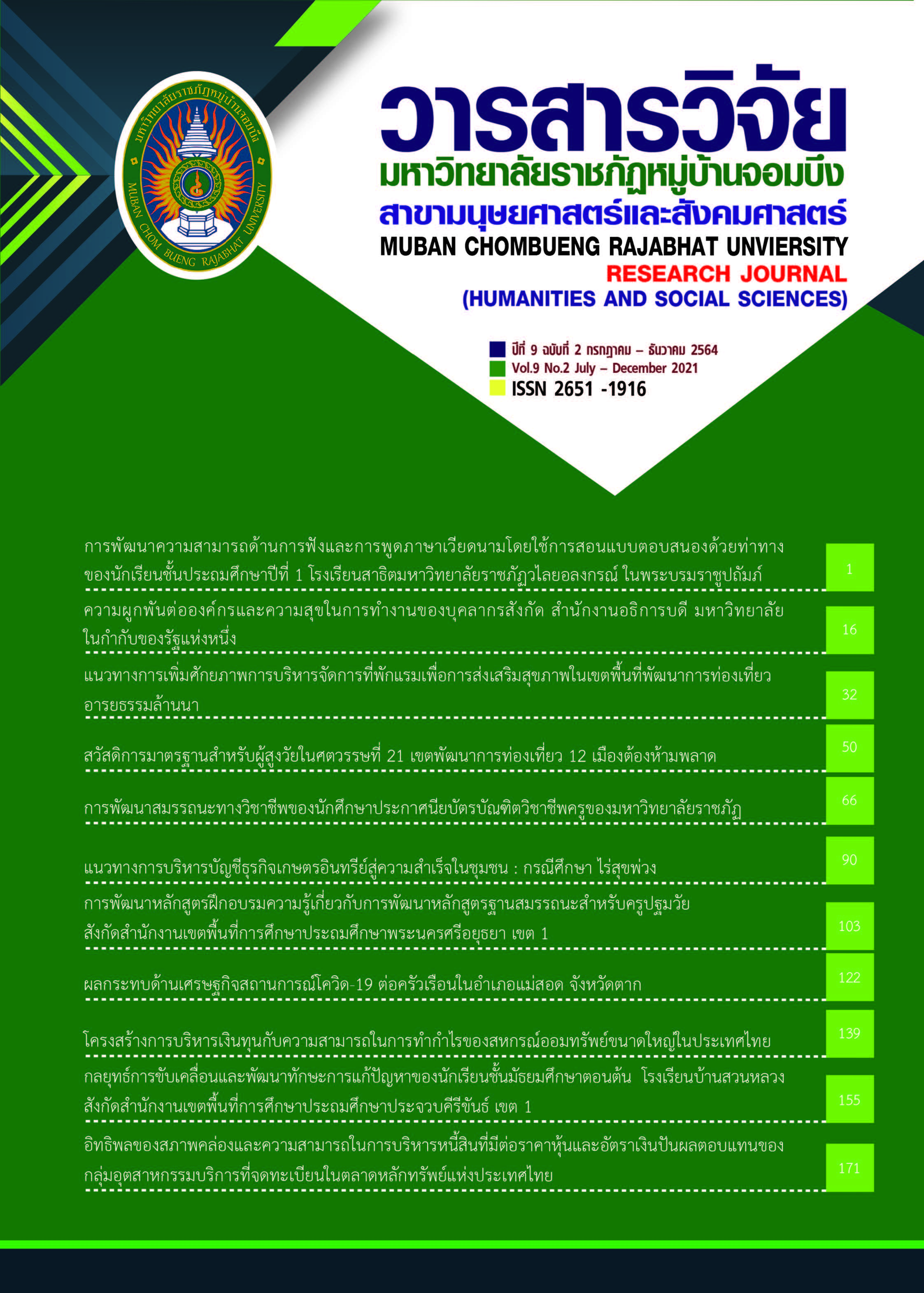ความผูกพันต่อองค์กรและความสุขในการทำงานของบุคลากรสังกัดสำนักงานอธิการบดี มหาวิทยาลัยในกำกับของรัฐแห่งหนึ่ง
คำสำคัญ:
ความผูกพันต่อองค์กร, ความสุขในการทำงาน, สำนักงานอธิการบดีบทคัดย่อ
การวิจัยครั้งนี้มีวัตถุประสงค์เพื่อ (1) เปรียบเทียบความผูกพันต่อองค์กรจำแนกตามปัจจัยด้านประชากรศาสตร์ (2) ศึกษาปัจจัยที่ส่งผลต่อความผูกพันต่อองค์กร และ (3) ศึกษาความสัมพันธ์ระหว่างปัจจัยความผูกพันต่อองค์กรกับความความสุขในการทำงาน กลุ่มตัวอย่างที่ใช้การวิจัยคือ บุคลากรสำนักงานอธิการบดี มหาวิทยาลัยในกำกับของรัฐแห่งหนึ่ง จำนวน 130 คน โดยใช้แบบสอบถามเป็นเครื่องมือในการเก็บรวบรวมข้อมูล สถิติที่ใช้ในการวิเคราะห์ข้อมูล ได้แก่ ค่าความถี่ ค่าร้อยละ ค่าเฉลี่ย ค่าเบี่ยงเบนมาตรฐาน การทดสอบที การวิเคราะห์ความแปรปรวนแบบทางเดียว การวิเคราะห์การถดถอยพหุคูณแบบลำดับขั้น และการวิเคราะห์สหสัมพันธ์แบบเพียร์สัน
ผลการวิจัยพบว่า (1) กลุ่มตัวอย่างที่มีเพศและฝ่ายงานที่สังกัดแตกต่างกันมีความผูกพันต่อองค์กรแตกต่างกัน อย่างมีนัยสำคัญทางสถิติที่ระดับ .05 (2) ปัจจัยด้านความมั่นคงในการทำงาน ด้านความสัมพันธ์กับเพื่อนร่วมงาน และด้านภาวะผู้นำ ส่งผลต่อความผูกพันต่อองค์กร อย่างมีนัยสำคัญทางสถิติที่ระดับ .05 โดยตัวแปรดังกล่าวสามารถทำนายความผูกพันต่อองค์กรได้ร้อยละ 56.00 มีสมการทำนายคือ Y = 0.77 + 0.382 (X4) + 0.289 (X5) + 0.151 (X2) (3) ความผูกพันต่อองค์กรมีความสัมพันธ์กับความสุขในการทำงาน อย่างมีนัยสำคัญทางสถิติที่ระดับ .01 โดยมีความสัมพันธ์ในทิศทางบวก (r=0.660) ผลการวิจัยครั้งนี้สามารถนำไปเป็นแนวทางในการกำหนดนโยบายในการบริหารทรัพยากรมนุษย์ขององค์กร เพื่อเสริมสร้างให้บุคลากรมีความผูกพันต่อองค์กรและมีความสุขในการทำงาน โดยหากบุคลากรมีความผูกพันต่อองค์กรและความสุขในการทำงานก็จะแสดงพฤติกรรมการทำงานที่พึงประสงค์ซึ่งจะส่งผลต่อความสำเร็จขององค์กรต่อไป
เอกสารอ้างอิง
2. จิระพร จันทภาโส. (2558). ความผูกพันต่อองค์การของข้าราชการครูและบุคลากรทางการศึกษาในวิทยาลัยเทคนิคหาดใหญ่ จังหวัดสงขลา. ปริญญานิพนธ์บริหารธุรกิจมหาบัณฑิต, มหาวิทยาลัยหาดใหญ่. สงขลา.
3. เฉลิมขวัญ เมฆสุข และประสพชัย พสุนนท์. (2560). ปัจจัยคุณภาพชีวิตการทํางานที่ส่งผลต่อความผูกพันต่อองค์กรของพนักงานระดับปฏิบัติการบริษัท สยามฟิตติ้งส์ จํากัด. วารสารธุรกิจปริทัศน์, 9(1), 33-50.
4. ชินกร น้อยคำยาง และปภาดา น้อยคำยาง. (2555). ปัจจัยที่ส่งผลต่อดัชนีความสุขในการทำงานของบุคลากรในสำนักหอสมุดกลางมหาวิทยาลัยศรีนครินทรวิโรฒ (รายงานผลการวิจัย). มหาวิทยาลัยศรีนครินทรวิโรฒ. กรุงเทพฯ.
5. นิตยา บ้านโก๋. (2558). ปัจจัยที่มีผลกับความผูกพันต่อองค์กรของบุคลากรภาครัฐศูนย์ฝึกพาณิชย์นาวี กรมเจ้าท่า กระทรวงคมนาคม. ปริญญานิพนธ์รัฐศาสตรมหาบัณฑิต, มหาวิทยาลัยธรรมศาสตร์. กรุงเทพฯ.
6. บุญชม ศรีสะอาด. (2543). การวิจัยเบื้องต้น. พิมพ์ครั้งที่ 6. กรุงเทพฯ: สุวีริยาสาส์น.
7. พรรณพนัช ไตรรัตนนุกูล. (2554). ความสัมพันธ์ระหว่างความสุขในการทำงานและความผูกพันต่อองค์กรของพนักงานในบริษัท ไอ.โอ.เทคนิค จำกัด. ปริญญานิพนธ์บริหารธุรกิจมหาบัณฑิต สาขาวิชาการประกอบการ, มหาวิทยาลัยศิลปากร. นครปฐม.
8. ลลิตา จันทร์งาม. (2559). ปัจจัยที่ส่งผลต่อความผูกพันต่อองค์การของพนักงานธนาคารออมสิน สำนักงานใหญ่ กลุ่มลูกค้าบุคคล. ปริญญานิพนธ์รัฐศาสตรมหาบัณฑิต, มหาวิทยาลัยธรรมศาสตร์. กรุงเทพฯ.
9. วรารักษ์ ลีเลิศพันธ์. (2557). ปัจจัยที่มีผลต่อระดับความผูกพันต่อองค์กรของพนักงานบริษัท เนชั่น บรอดแคสติ้ง คอร์ปอเรชั่น จำกัด (มหาชน). ปริญญานิพนธ์บริหารธุรกิจมหาบัณฑิต, มหาวิทยาลัยเนชั่น. ลำปาง.
10. สายสุนีย์ เบ็ญจโภคี. (2559). การสำรวจความผูกพันต่อองค์การของบุคลากรสถาบันแห่งชาติเพื่อการพัฒนาเด็กและครอบครัว. วารสารการพัฒนางานประจำสู่งานวิจัย, 3, 53-62.
สุกรรณิการ์ เจียมคงอยู่. (2550). การรับรู้วัฒนธรรมองค์การที่มีผลต่อความผูกพันต่อองค์การของข้าราชการพยาบาลโรงพยาบาลตากสิน. ปริญญานิพนธ์บริหารธุรกิจมหาบัณฑิต สาขาวิชาการจัดการ, มหาวิทยาลัยศรีนครินทรวิโรฒ, กรุงเทพฯ.
อนันต์ มณีรัตน์. (2559). ความผูกพันในองค์การ ศึกษากรณี สำนักเลขาธิการคณะรัฐมนตรี. ปริญญานิพนธ์รัฐประศาสนศาสตรมหาบัณฑิต, จุฬาลงกรณ์มหาวิทยาลัย. กรุงเทพฯ.
อภิชาติ ภู่พานิช. (2551). การใช้ดัชนีวัดระดับความสุขในการทำงานของบุคลากรสังกัดสำนักงานอธิการบดีมหาวิทยาลัยธรรมศาสตร์. ปริญญานิพนธ์สังคมสงเคราะห์ศาสตรมหาบัณฑิต, มหาวิทยาลัยธรรมศาสตร์. กรุงเทพฯ.
อาริญา เฮงทวีทรัพย์สิริ. (2558). ความผูกพันต่อองค์การ บุคลิกภาพห้าองค์ประกอบ และความสุขในการทำงานของพยาบาล โดยมีพฤติกรรมการเป็นสมาชิกที่ดีขององค์การเป็น
ตัวแปรสื่อ: กรณีศึกษาโรงพยาบาลมหาวิทยาลัยในกำกับของรัฐแห่งหนึ่ง. ปริญญานิพนธ์ศิลปศาสตรมหาบัณฑิต สาขาวิชาจิตวิทยาอุตสาหกรรมและองค์การ, มหาวิทยาลัยธรรมศาสตร์. กรุงเทพฯ.
Allen, N. J., & Meyer, J. P. (1990). The measurement and antecedents of affective, continuance, and normative commitment to the organization. Journal of Occupational Psychology, 63(10), pp. 1-18.
Cronbach, L. J. (1970). Essentials of psychological testing. 3rd Edition. New York: Harper & Row.
Hinkle, D.E. (1998). Applied Statistics for the Behavior Sciences. 4th Edition. New York: Houghton Mifflin.
Manion, J. (2003). Joy at work: Creating a positive workplace. Journal of Nursing Administration, 33(12), 652-655.
Steers, R.M., & Porter, L. (1991). Motivation and Work Behavior. New York: McGraw- Hill.
Steers, Richard M. (1977). Organizational Effectiveness: Behavioral View. Santa Monica California: Goodyear Publishing Company In.
Taro Yamane. (1973). Statistics: An Introductory Analysis. 3rd Edition. New York: Harper and Row.
Warr, P. (1990). The measurement of well-being and other aspects of mental health. Journal of Occupation Psychology. 63 (3), 193-210.
ดาวน์โหลด
เผยแพร่แล้ว
รูปแบบการอ้างอิง
ฉบับ
ประเภทบทความ
สัญญาอนุญาต
วารสาร TCI อยู่ภายใต้การอนุญาต Creative Commons Attribution-NonCommercial-NoDerivatives 4.0 International (CC BY-NC-ND 4.0) เว้นแต่จะรุบุไว้เป็นอย่างอื่นโปรดอ่านหน้านโยบายของเราสำหรับข้อมูลเพิ่มเติมเกี่ยวกับการเช้าถึงแบบเปิด ลิขสิทธิ์ และการอนุญาต



